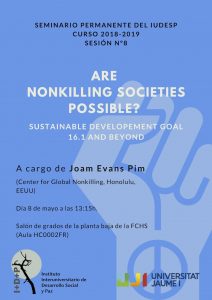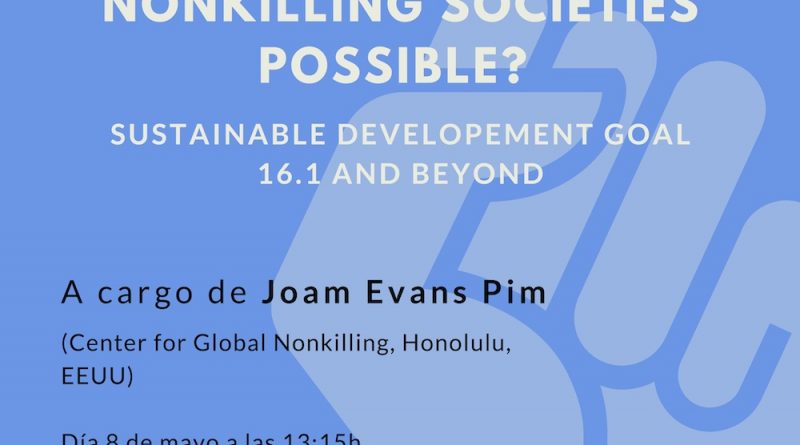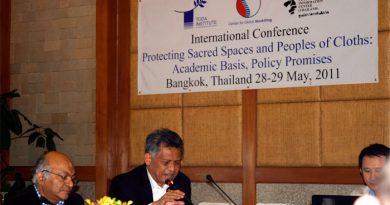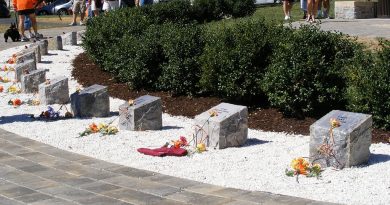«Are Nonkilling Societies Possible?» Seminar in Castelló
The Interuniversity Institute for Social Development and Peace (IUDESP), a joint R&D center of Jaume I University and the University of Alacant as well as a World Health Organization Collaborating Centre on Social Inclusion and Health, will be hosting on May 8, 2019 a Research Seminar by CGNK Director Joám Evans Pim on the topic «Are Nonkilling Societies Possible? Sustainable Development Goal 16.1 and Beyond». The event is part of IUDESP Permanent Seminars initiative and will take place at the “Salón de Grados” of the Faculty of Humanities and Social Sciences at Castelló starting at 13.15 pm.
Seminar Summary
 In September 2015 the United Nations adopted the newly drafted Sustainable Development Goals (SDGs), as the post-2015 development agenda. The SDGs replaced the Millennium Development Goals that expired at the end of 2015 and, for the first time, include an item explicitly addressing the need for “peaceful and inclusive societies”, setting the goal to “significantly reduce all forms of violence and related death rates everywhere” (16.1).
In September 2015 the United Nations adopted the newly drafted Sustainable Development Goals (SDGs), as the post-2015 development agenda. The SDGs replaced the Millennium Development Goals that expired at the end of 2015 and, for the first time, include an item explicitly addressing the need for “peaceful and inclusive societies”, setting the goal to “significantly reduce all forms of violence and related death rates everywhere” (16.1).
The SDGs are to significantly shape international development policies until 2030 and set targets to be met by major national and international agencies. Besides the overarching SDG 16.1, other goals specifically address different types and contexts of violence (4a, 4.7, 5.2, 5.3, 16.2) and a number of risk factors closely connected to violence. However, the possibility of significantly reducing death rates and building killing-free societies is still strongly questioned.
The field of violence prevention has grown significantly over the past decade, signalled in 2002 with the publication of the World Report on Violence and Health that clearly identified violence as “a preventable disease”. This seminar will explore some of the accumulative supportive evidence for violence prevention policies that provide a solid base for taking SDG 16.1 seriously and making the case for the necessary build up to escalate their application.
We currently have much of the needed knowledge to drastically reduce death rates everywhere and to start building killing-free societies, as sought by SDG 16.1. Failure to seize this opportunity may not only prove an strategic failure in the efforts to reduce violence, but may also jeopardise other development goals. SDGs are interdependent, and failure to address certain targets will obstruct advances in others. Disregarding violence prevention as an integral part of the solution could undermine the process and even lead to unwarranted harmful practices.




